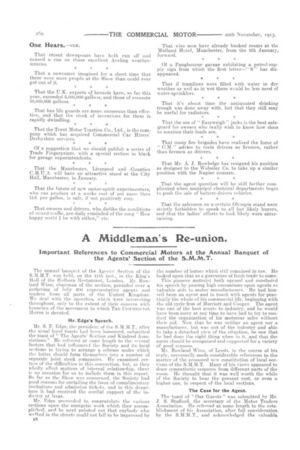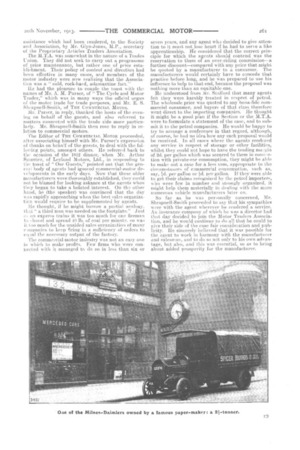A Middleman' s Re-union.
Page 4

Page 5

If you've noticed an error in this article please click here to report it so we can fix it.
Important References to Commercial Motors at the Annual Banquet of the Agents' Section of the S.M.M.T.
The annual banquet of the Agents' Section of the S.M.M.T. was held, on the 11th inst., in the King's Hall of the Holborn Restaurant, London. Mr. Rowland Winn, chairman of the section, presided over a gathering of fully 600 representative agents and traders from all parts of the United Kingdom. We deal with the speeehes,, whieh were interesting throughout, only to the extent of their concern with branches of the movement to which THE COMMERCIAL MOTOR is devoted.
Mr. Edges Speech.
Mr. S. R Edge, the president of the after the usual loyal toasts had been honoured, submitted the toast of " The Agents' Section and Kindred Associations." He referred at some length to the several factors that had influenced the Society and its local sections in trying to arrange a scheme under which the latter should form themselves into a number of separate joint stock companies. He examined certain of the difficulties in this connection, but as they wholly affect matters of internal relationship, there is no occasion for us to include them in this report. So far as the Show was concerned, the Society had good reasons for curtailing the issue of complimentary invitations and admission tielo=ts, and in this departure it had received the cordial support. of the induetry at large. Mr. Edge proceeded to congratulate the various sections upon the energetic work which they accomplished, and he next pointed out that anybody who wniked in the streets could not fail to be impressed hy the number of horses which still remained in use. He looked upon that as a guarantee of fresh trade to come. This pioneer motorist both opened and concluded his speech by passing high encomiums upon agents as valuable aids to motor manufacturers. He had himself been an agent and in touch with agents for practically the whole of his commercial life, beginning with the old cycle firm of Marriott and Cooper. The agent was one of the best assets to industry, and he would have been sorry at any time to have had to try to conduct the organization of his motorcar sales without their aid. Now that he was neither an agent nor a manufacturer, but was out of the industry and able to take a detached view of the situation, he saw that he had done the right thing when in it, and that the agent should he recognized and supported for a variety of good reasons. Mr. Rowland Winn, of Leeds, in the course of his reply, necessarily made considerable references to the matter of the proposed new constitution of local sections of the S.M.M.T. Many of his views appeared to draw sympathetic response from different parts of the room. He thought that. it was well worth the while of the Society to bear the present cost, or even a higher one, in respect of the local sections.
The Case for the Agent.
The toast. of "Our Guests" was submitted by Mr. J. S. Stafford. the secretary of the Motor Traders Association. He referred at some length to the establishment of his Association, after full consideration by the S.M.M.T., and acknowledged the valuable assistance which had been rendered, to the. Society and AssOciation, by Mr. Glyn-Jones, M.P., secretary of the Proprietary Articles Traders Association.
The M.T.A. was somewhat. in the nature of a Trades Union. They did not seek to carry out a programme of price maintenance, hut rather one of price establishment. Their policy of control and direction had been effective in many cases, and members of the motor industry were now realizing that the Association was a " cold, rock-hard, adamantine fact."
lie had the pleasure to couple the toast with the names of Mr. A. M. Purser, of " The Cynic and Motor Trader," which was in many ways the official organ of the. motor trade for trade purposes, and Mr. E. S. Shrapnell-Smith, of THE COMMERCIAL MOTOR, Mr. Purser, in reply, thanked the hosts of the evening on behalf of the guests, and also referred to matters connected with. the trade side more particularly. Mr. Shrapnell-Smith then rose to reply in relation to commercial motors.
The Editor of TRF, COMMERCIAL MOTOR proceeded, after associating himself with Mr. Purser's expression of thanks on behalf of the guests, to deal with the follov:ing points, amongst others. He referred back to the occasion of the 1912 dinner, when Mr. Arthur Spurrier, of Leyland Motors, Ltd., in responding to ties toast of Our Guests,' pointed out that the general body of agents had ignored commercial-motor developments in the early days. Now that these older manufacturers were thoroughly established, they could not be blamed for looking askance at the agents when they began.to take a belated interest. On ths,a other hand, he (the speaker) was convinced that the day was rapidly approaching when the hest sales organization would require to be supplemented by agents.
He thought, if he might borrow a partial analogy, that " a third man was needed on the footplate." Just es. on express trains it was too much for one fireman to hovel and spread 40 lb. of coal per minutc„ so was it too much for the unaided sales organization of many e.minanies to keep fi_ring in a sufficiency of orders to equal the necessary output of the factory.
The commercial-motor industry was not an easy one in which to make profits. Few firms who were connected with it managed to do so in less than six or
seven years, and any agent who decided to give attention to it must not lose heart if he had to serve-a like apprenticeship. He considered that the correct principle for which the agents should contend was the reservation to them of an over-riding commission—a further discount—compared with any price that might be quoted by a manufacturer to a consumer. The manufacturers would certainly have to concede that practice before long, and he was prepared to use his influence to help to that end, because the proposal was nothing more than an equitable one.
He understood from Mr. Stafford that many agents felt they were harshly treated in respect of petrol. The wholesale price was quoted to any bona-fide commercial consumer, and buyers of that class therefore went direct to the importing companies. He thought it might be a good plan if the Section or the M.T.A. were to formulate a statement of the case, and to submit it to the petrol companies. He would be happy to try to arrange a conference in that regard, although; of course, he bad no idea how any such proposal would be received. In all cases where the agents rendered any service in respect of storage or other facilities, whilst they could not hope to have the trading margin of 2d. per gallon which was secured to them in con I1C`Ction with. private-ear consumption, they might be able to make out a case for a less sum, appropriate to the circumstances of commercial consumption, such as, say, Id. per gallop or Ad. per gallon. If they were able to get their claims recognized by the petrol importers, who were few in number and strongly organized, it might help them materially in dealing with the more numerous vehicle manufacturers later on.
So far as he was personally concerned, Mr. Shrapnell-Smith proceeded to say that his sympathies were with the agent wherever he rendered a service. An insurance company of which he was a director had that day decided to join the Motor Traders Association, and he would .continue to do all that he could to give their side of the ease fair consideration and publicity. He sincerely believed that it was possible fin the agent to work in harmony with the manufacturee and salesman, and to do so not only to his own advantage, hut also, and this was essential, so as to bring about added prosperity for the manufacturer.






















